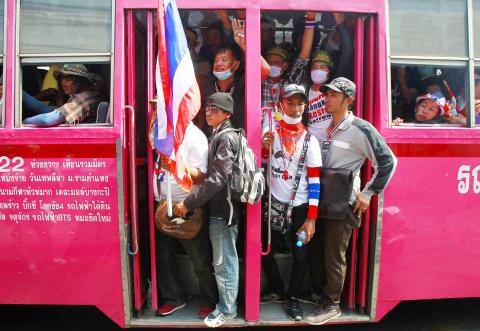Thailand’s government is to deploy 10,000 police in the capital for Sunday’s election, which protesters have promised to disrupt as part of their drawn-out attempt to topple Thai Prime Minister Yingluck Shinawatra.
The government decided on Tuesday to press ahead with Sunday’s election, which the main opposition party plans to boycott and despite warnings that it could lead to more violence without resolving the country’s increasingly bitter political divide.
“I ask Bangkok residents to come out and vote,” Thai Labor Minister Chalerm Yoobamrung told reporters yesterday. “The police will take care of security... Those who are thinking of going and shutting polling stations in the morning should think twice because the police will not allow them to.”

Photo: Reuters
Protesters prevented early voting at many polling stations in Bangkok on Sunday last week.
The protesters accuse Yingluck of being a puppet of her brother, former Thai prime minister Thaksin Shinawatra, a man they say is a corrupt crony capitalist who used taxpayers’ money to buy elections with costly populist giveaways.
Chalerm, who is in charge of a state of emergency imposed last week, told reporters about 10,000 police would be dispatched on Sunday to take care of security at the capital’s polling stations.
Even though Yingluck’s ruling party is certain to win, not enough candidates have been able to register to provide a quorum in the new parliament after the election.
By-elections will have to be held later to fill the vacant seats, which means the prospect of a caretaker, and fairly powerless, government under Yingluck for several more months.
The protests are taking their toll on the economy and even major foreign investors are beginning to question the merits of ploughing any more money into their Thai operations.
Protesters took to the streets of Bangkok again yesterday, but in a relatively small rally of about 500 people.
They were without their firebrand leader, Suthep Thaugsuban, who was apparently deterred by the previous day’s violence in which a protester was shot and wounded.
In a sign of how the legal establishment has largely lined up against Yingluck’s government, a criminal court on Tuesday rejected a government application for an arrest warrant against Suthep, saying there was not enough evidence to grant it.
Suthep is already wanted for insurrection and on charges of murder related to violence in 2010 when, as Thai deputy prime minister, he sent in troops to crush protests by supporters of Thaksin. The death toll then was more than 90.
The Election Commission, also widely seen as favouring the establishment-aligned opposition, had been arguing for a delay in the vote of up to four months, saying the country was too unstable to hold an election.
Analysts say the army is nervous that this time intervention would trigger even more violence with Thaksin’s supporters threatening to descend on the capital if Yingluck is overthrown.
Yingluck is Thailand’s fifth prime minister since the populist Thaksin was toppled by the army in 2006 and went into exile two years later to escape a jail sentence that was handed down for abuse of power.

Nauru has started selling passports to fund climate action, but is so far struggling to attract new citizens to the low-lying, largely barren island in the Pacific Ocean. Nauru, one of the world’s smallest nations, has a novel plan to fund its fight against climate change by selling so-called “Golden Passports.” Selling for US$105,000 each, Nauru plans to drum up more than US$5 million in the first year of the “climate resilience citizenship” program. Almost six months after the scheme opened in February, Nauru has so far approved just six applications — covering two families and four individuals. Despite the slow start —

MOGAMI-CLASS FRIGATES: The deal is a ‘big step toward elevating national security cooperation with Australia, which is our special strategic partner,’ a Japanese official said Australia is to upgrade its navy with 11 Mogami-class frigates built by Japan’s Mitsubishi Heavy Industries, Australian Minister for Defence Richard Marles said yesterday. Billed as Japan’s biggest defense export deal since World War II, Australia is to pay US$6 billion over the next 10 years to acquire the fleet of stealth frigates. Australia is in the midst of a major military restructure, bolstering its navy with long-range firepower in an effort to deter China. It is striving to expand its fleet of major warships from 11 to 26 over the next decade. “This is clearly the biggest defense-industry agreement that has ever

North Korean troops have started removing propaganda loudspeakers used to blare unsettling noises along the border, South Korea’s military said on Saturday, days after Seoul’s new administration dismantled ones on its side of the frontier. The two countries had already halted propaganda broadcasts along the demilitarized zone, Seoul’s military said in June after the election of South Korean President Lee Jae-myung, who is seeking to ease tensions with Pyongyang. The South Korean Ministry of National Defense on Monday last week said it had begun removing loudspeakers from its side of the border as “a practical measure aimed at helping ease

DEADLY TASTE TEST: Erin Patterson tried to kill her estranged husband three times, police said in one of the major claims not heard during her initial trial Australia’s recently convicted mushroom murderer also tried to poison her husband with bolognese pasta and chicken korma curry, according to testimony aired yesterday after a suppression order lapsed. Home cook Erin Patterson was found guilty last month of murdering her husband’s parents and elderly aunt in 2023, lacing their beef Wellington lunch with lethal death cap mushrooms. A series of potentially damning allegations about Patterson’s behavior in the lead-up to the meal were withheld from the jury to give the mother-of-two a fair trial. Supreme Court Justice Christopher Beale yesterday rejected an application to keep these allegations secret. Patterson tried to kill her